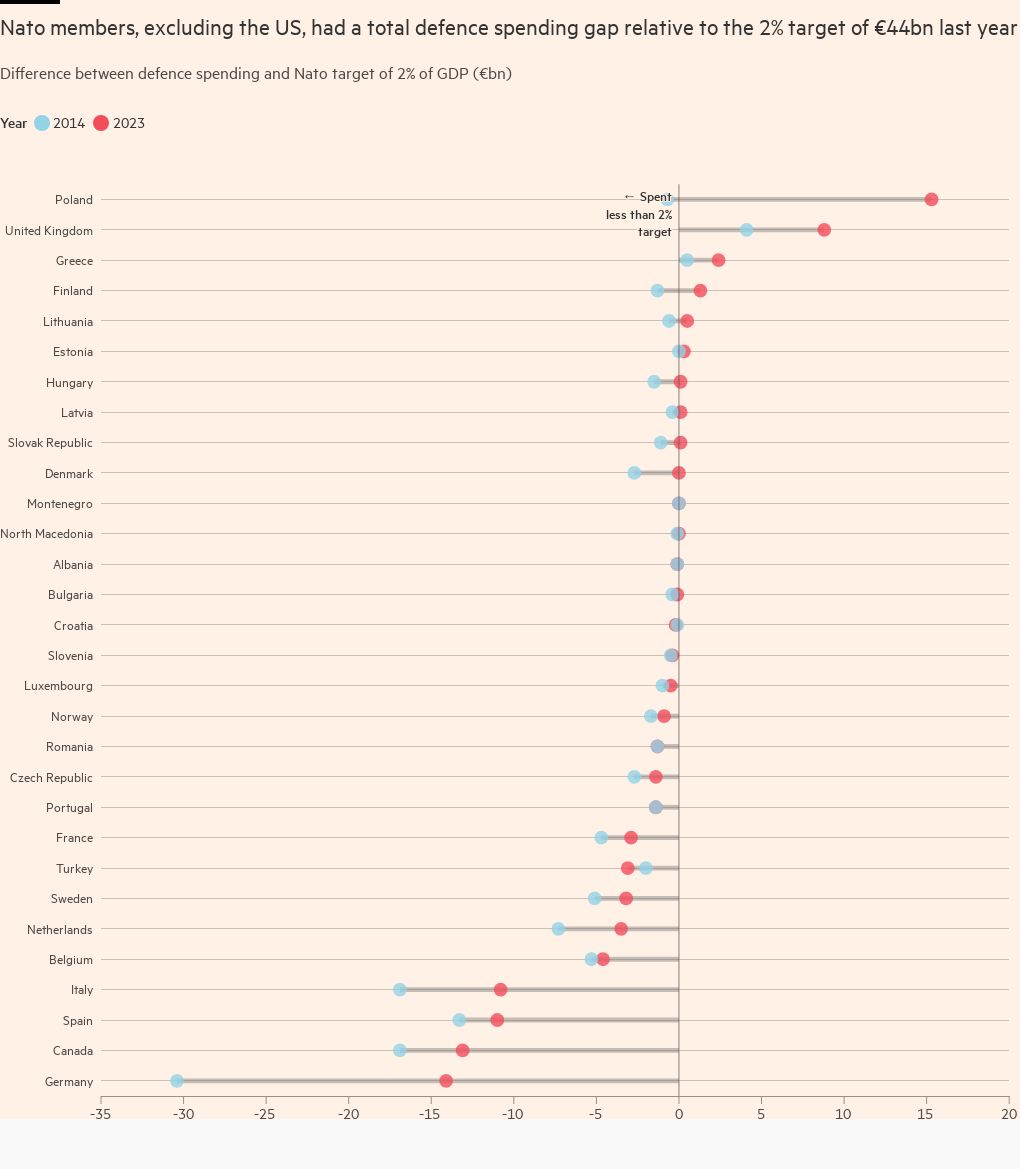Why a majority of EU countries want the EIB to finance weapons

Roula Khalaf, Editor of the FT, selects her favourite stories in this weekly newsletter.
This article is an on-site version of our Europe Express newsletter. Sign up here to get the newsletter sent straight to your inbox every weekday and Saturday morning
Good morning. Russia’s Vladimir Putin has claimed a fifth term in the Kremlin through an election where all opposition was banned and criticism of the president — or his war — was outlawed. Six more years of Putin is a threat to Europe and the world, writes the FT’s editorial board, as repression at home runs hand in hand with a more belligerent policy abroad.
Today, our finance correspondent reports on a letter from a majority of EU states calling for the bloc’s bank to invest in weapons, and our parliament correspondent explains how the far right became Europe’s digital champions.
Changing priorities
EU leaders from 14 countries including Germany, France and Italy — the bloc’s three largest — have backed calls for the European Investment Bank to lend more money to the defence sector, writes Paola Tamma.
Context: The EIB is the EU’s lending arm and the world’s largest multilateral development bank. It can invest in dual-use goods that have both military and civilian applications, such as drones, but not weapons or military infrastructure. The European Commission has proposed to change the EIB’s mandate to step up defence production in the context of the war in Ukraine. Now, leaders are weighing in.
Ahead of an EU summit later this week when the topic will be discussed, the 14 leaders wrote that the EIB “financing for security and defence needs to be enhanced in line with EU’s new priorities”.
“The EIB’s lending power is urgently needed in this new EU priority area and this is why we must discuss ways to enable further investment by the EIB in this sector,” Finnish Prime Minister Petteri Orpo, who initiated the letter, told the FT.
While the signatories do not explicitly say the EIB lending policy must change, they are open to the option. The letter calls for “re-evaluating current definitions of dual-use projects and the list of excluded activities”, as long as that’s done in keeping with “the EIB’s risk profile and that safeguards EIBs financing basis”.
That’s code for ensuring the EIB does not lose its triple A and high environmental, social and governance ratings — something that’s key to countries like Germany and the Netherlands.
The letter was also signed by the leaders of Bulgaria, the Czech Republic, Denmark, Estonia, Latvia, Lithuania, the Netherlands, Poland, Romania and Sweden. Fourteen is a significant number, as any changes would need the backing of a majority of EU countries.
They say that the changes could have “a signalling effect” to private investors, getting them to pour more money into defence. They also call for “clarifications . . . to reassure that there are no restrictions [on defence investments] based on EU legislation”.
“I think that if this is done in a transparent way, it would not put the EIB’s credit or ESG ratings at risk. It needs to be made more clear that there are no restrictions based on EU legislation as to defence investment,” Orpo said.
Chart du jour: Race to arms
Nato’s European members need to find an extra €56bn a year to meet the alliance’s defence spending target, though the shortfall has halved in the past decade.
Anti-social media
If the European elections were to be decided on Facebook, the far right would win, according to new research seen by Andy Bounds.
Context: Polls point to an increased support for populist and extreme right parties, with mainstream politicians increasingly adopting anti-immigration anti-green policies to try to stop voters defecting. The elections for the European parliament will take place June 6 to 9.
Denmark’s Common Consultancy has analysed Facebook posts by EU lawmakers and found that far-right MEPs are the most popular on it.
“Fringe factions, particularly the nationalistic and far-right, excel in mobilising the European population digitally,” said Eske Vinther-Jensen, co-author of the report.
Almost two-thirds of social media users are on Facebook weekly, making it the most popular platform for every age group except 14 to 25-year-olds, he said.
Common analysed all Facebook posts by the 771 MEPs who held office at some point between 2019-23 and owned pages, as well as users’ reactions to them.
Of 572mn interactions, Jordan Bardella, the French far-right leader, was responsible for 13.2mn. Vinther-Jensen said the majority of interactions were positive.
The average post by a Green MEP received just 241 interactions, five times lower than the average MEP of the far-right Identity and Democracy (ID) grouping.
Vinther-Jensen said popular topics were the need to stop sending weapons to Ukraine and climate change. “It’s difficult to mobilise on the green transition except people who are opposed to it,” he said.
The most popular centrist is Polish socialist Robert Biedroń, with 17.6mn interactions. He uses himself and his partner to promote values of diversity and family — and avoids commenting too much on EU legislation.
What to watch today
Now read these
Claudia Buch interview: Europe’s top banking supervisor warns of rising insolvencies, geopolitical risks and upheaval in energy-intensive industries.
Swiss behemoth: A year on from its rescue of Credit Suisse, has UBS been able to make a success of its wealth business and become Europe’s Morgan Stanley?
Shakhtar Donetsk: How a Ukrainian football club battled a decade of conflict and made its management team “crisis-proof”.
Are you enjoying Europe Express? Sign up here to have it delivered straight to your inbox every workday at 7am CET and on Saturdays at noon CET. Do tell us what you think, we love to hear from you: europe.express@ft.com. Keep up with the latest European stories @FT Europe

Comments